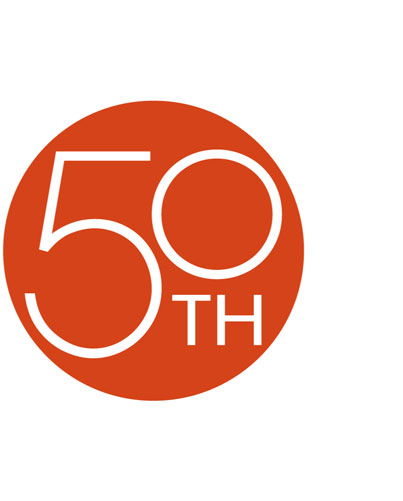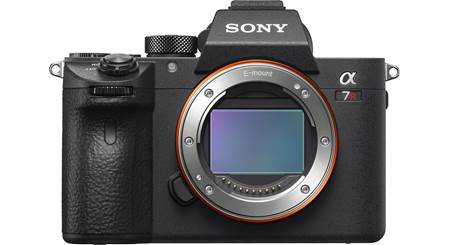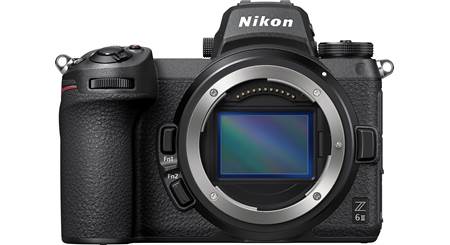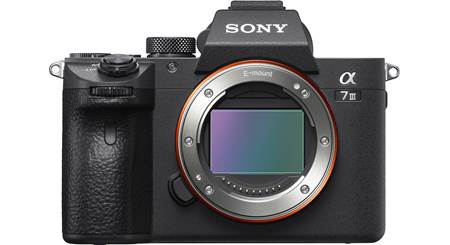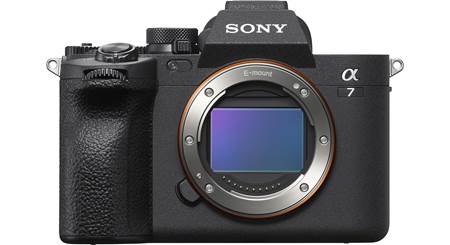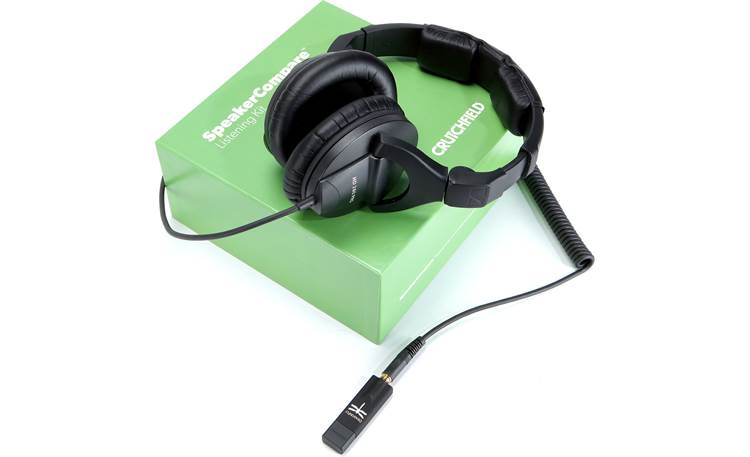About the Sony Alpha a7R III A (no lens included)

Big on performance, not on bulk
Big on performance, not on bulk
Looking for excellent low-light performance from a compact mirrorless body? Sony's image-stabilized Alpha a7R III A is a teriffic choice for colorful stills and gorgeous 4K video footage. Its rugged magnesium-alloy body is weather-sealed against dust and moisture for capturing shots at weddings, sporting events, and other fun outdoor activities.
Pair it with premium glass for the best image quality
I'm a Canon shooter by trade, but one reason I'd be tempted to switch to Sony is their outstanding lineup of E-mount lenses.
Sony makes some of the best optical elements on the planet, and their E-mount lenses (especially their higher-end glass) are world-famous for their light-gathering abilities and quick, ultra-sharp focusing.
It's worth noting that this "body only" configuration of the Alpha a7R III A does not come with a lens in the box. Check out my article on choosing camera lenses to find the right one for you.
Product highlights:
- 42.4-megapixel full-frame Exmor™ R CMOS sensor
- BIONZ X image processor for high-resolution, low-noise photos and fast autofocus performance
- compatible with full-frame Sony E-mount lenses
- 5-axis in-body image stabilization helps keep photos and videos blur- and shake-free
- high-resolution electronic viewfinder for easy eye-level composition
- durable magnesium-alloy body is weather-sealed against dust and moisture
- tilting 3" LCD touchscreen for flexible composition and review
- enhanced Fast Hybrid AF system for fast, precise autofocus
- 399 phase detection AF points cover approximately 68% of image area; 425 contrast-detection AF points
- Eye AF control for accurate eye detection; can prioritize a single pupil when subject is partially turned away from camera
- includes rechargeable NP-FZ100 lithium ion battery, charger, micro USB cable, and neck strap
Exposure modes:
- up to 10 frames per second in continuous shooting mode
- program auto, shutter-priority, aperture-priority, manual, and fully automatic exposure modes
- shutter speed range: 30-1/8,000 seconds, bulb
- silent shooting mode eliminates camera shake caused by shutter movement
- ISO range: 100-32,000 (expandable to ISO 50 to 102,400)
File formats and storage:
- built-in Wi-Fi allows you to transfer photos and video to a compatible mobile device for instant sharing
- records in RAW and JPEG formats
- top JPEG resolution (pixels): 7,952 x 5,304
- 4K Ultra HD video recording
- movie file formats: XAVC S, AVCHD
- supports HDR movie production with S-Log3 and S-Log2 gamma curves
- dual memory card slots accept SD, SDHC and SDXC cards and Memory Stick PRO Duo and PRO-HG Duo memory cards
- one UHS-II compatible slot
Connections:
- super-speed micro USB (Type C) interface (cable included) for fast data transfer, charging, and tethered shooting
- uncompressed, clean HDMI output supports 4K and full HD
- micro HDMI (Type D) output (cable not included)
- 3.5mm microphone input and 3.5mm headphone jack
Dimensions and warranty:
- 5-1/2"W x 3-13/16"H x 3"D
- weight: 23.2 oz. (with battery)
- warranty: 1 year
- MFR # ILCE7RM3A/B
What's in the box:
Sony Alpha a7R III A (no lens included) owner's manual
- Camera body (black)
- ALC-B1EM Body cap (installed)
- Accessory shoe cap (installed)
- Eyepiece cup (installed)
- NP-FZ100 Lithium-Ion rechargeable battery (7.2V 2280mAh 16.4Wh)
- BC-QZ1 battery charger (DC output: 8.4V 1.6A)
- 22" AC cord (unpolarized C7 plug)
- 39" USB cable (Type A USB 3.0 on one end and USB-C on other end)
- Cable protector
- Shoulder strap
- Operating Instructions (English)
- Operating Instructions (French)
- Reference Guide
- Limited Warranty (US + Canada)
- Lenses & Accessories Promo card
- Registration card
Customer reviews for Sony Alpha a7R III A (no lens included)
Loading...
Loading reviews...
Average review:
5.0 out of 5 starsThanks for submitting your review
Customer photos
This review was collected as part of a promotion
Pros:
Cons:
More details on the Sony Alpha a7R III A (no lens included)

Features & specs
| General | ||
|---|---|---|
| LCD Screen Size | 3" | |
| Adjustable-angle LCD | Yes | |
| Touchscreen | Yes | |
| Waterproof | No | |
| GPS-enabled | Via Smartphone | |
| Lens 35mm Equivalent | None included | |
| Optical Zoom | N/A | |
| Digital Zoom | N/A | |
| Filter Diameter | N/A | |
| Manual Focusing | Yes | |
| Manual Exposure | Yes | |
| Built-in Flash | No | |
| HDMI Output | Micro | |
| Wireless Features | ||
| Wi-Fi | Built-in | |
| Bluetooth | Y (4.1) | |
| Live Stream Capable | Y | |
| Memory | ||
| Internal Memory | None | |
| Memory Stick | PRO Duo, PRO-HG Duo | |
| CFexpress Cards | No | |
| CompactFlash Cards | No | |
| SD Cards | SD, SDHC, SDXC | |
| XQD Cards | No | |
| Image | ||
| Sensor Size | Full-frame | |
| Megapixels | 42.4 | |
| Image Stabilization | In-body | |
| Highest Resolution | 7952 x 5304 | |
| 4K Video | Yes | |
| Video Resolution | 3840 x 2160 | |
| Dimensions | ||
| Width (inches) | 5-1/2 | |
| Height (inches) | 3-13/16 | |
| Depth (inches) | 3 | |
| Weight With Battery (ounces) | 23.2 | |
| Warranty | ||
| Parts Warranty | 1 Year | |
| Labor Warranty | 1 Year | |
Product Research
Wi-Fi / Bluetooth
Play And Print Functions
Battery Information
Connections
Software
Recording Features
Overview: The Sony α7RIII (ILCE-7RM3A) Interchangeable-lens digital camera kit contains the α7RIII camera body, along with a rechargeable battery, battery charger, adjustable neck strap, and USB cable. The α7RIII has a full-frame 35mm image sensor, and is compatible with Sony E-mount lenses. With the LA-EA4 or LA-EA5 Mount Adapter, the camera can also use Sony A-mount lenses.
3" Tiltable LCD Screen: The α7RIII uses a 3" LCD screen with 2,359,296 dots. You can tilt the LCD up approximately 107° for low angle shots or tilt it down approximately 41° for high angle photography. The brightness of the LCD monitor can be adjusted in 5 steps from -2 to +2, plus a Sunny Weather mode.
0.5" OLED Electronic Viewfinder: The 0.5" high contrast Tru-Finder OLED electronic color viewfinder has 3,686,400 dots, and provides approximately 100% field of view. You can adjust the brightness in 5 steps. The built-in diopter lets you adjust the viewfinder image to your individual eyesight. You can set the camera to switch between the LCD screen and viewfinder automatically when you look into the EVF, or choose one or the other in the camera's menu.
Display Modes: In the monitor, you can choose from the following display types: Display All Info, Display No Info, Histogram, For Viewfinder, and Digital Level Gauge. When shooting with the viewfinder, you can choose from No Display Info, Histogram, and Level.
Live View: The α7RIII's Live View lets you use the LCD screen and Electronic Viewfinder to frame your photos as you shoot. When the Live View display is set to "Setting Effect On", the LCD or viewfinder will provide an accurate preview of your photo, including the white balance, exposure compensation, creative style or picture effect. With the "Setting Effect Off", you can check the image composition without the effects of the exposure settings.
Image Sensor: The α7RIII features a back-illuminated, full-frame 35mm Exmor-R CMOS image sensor (35.9 x 24.0mm) with a 3:2 aspect ratio. It has approximately 43.6-million total pixels and 42.4-million effective pixels.
Still Image Recording Formats: The α7RIII can shoot 35mm full-size image sensor photos in Large, Medium, and Small sizes. It can also shoot APS-C size equivalent pictures in L, M, and S. Still images are recorded in JPEG file format in Standard, Fine, and Extra Fine compression rates. You can choose to shoot in 3:2 or 16:9 aspect ratio, and in large, medium, and small image sizes. You can record still images using the 14-bit RAW format (Large size only), which is uncompressed with no processing performed in the camera. RAW images must be transferred to a computer for processing, editing, and printing using the downloadable Imaging Edge software. You can select the following image sizes:
| Aspect Ratio/Size | 35mm Full-Frame | APS-C Size |
|---|---|---|
| 3:2 Large | 7952 x 5304 (42M) | 5168 x 3448 (18M) |
| 3:2 Medium | 5168 x 3448 (18M) | 3984 x 2656 (11M) |
| 3:2 Small | 3984 x 2656 (11M) | 2592 x 1728 (4.5M) |
| 16:9 Large | 7952 x 4472 (36M) | 5168 x 2912 (15M) |
| 16:9 Medium | 5168 x 2912 (15M) | 3984 x 2240 (8.9M) |
| 16:9 Small | 3984 x 2240 (8.9M) | 2592 x 1456 (3.8M) |
| 3:2 RAW (L) | 7952 x 5304 (42M) | 5168 x 3448 (18M) |
| 16:9 RAW (L) | 7952 x 4472 (36M) | 5168 x 2912 (15M) |
Movie Recording Formats: The α7RIII can record 16:9 4K in XAVC S format and a maximum 100Mbps bit rate, as well as Full High Definition movies at 50 Mbps. You can also record movies in AVCHD format. All of the formats use MPEG-4 AVC/H.264 video compression. Audio is recorded in 2-channel LPCM (XAVC S) or 2-channel Dolby Digital (AVCHD). Movies can be recorded in either NTSC or PAL. You can select from the following bit rates/image quality (NTSC):
| File Format | Resolution | Average Bit Rate |
|---|---|---|
| XAVC S 4K | 3840 x 2160 | 30p / 100 Mbps 30p / 60 Mbps 24p / 100 Mbps 24p / 60 Mbps |
| XAVC S HD | 1920 x 1080 | 60p / 50 Mbps 60p / 25 Mbps 30p / 50 Mbps 30p / 25 Mbps 24p / 50 Mbps 120p / 100 Mbps 120p / 60 Mbps |
| AVCHD | 1920 x 1080 | 60i / 24 Mbps / FX 60i / 17 Mbps / FH |
Dual Slot/ Dual Media Options: The α7RIII camera has two slots for recording media -- Slot 1 supports SD, SDHC, and SDXC cards (UHS-I and UHS-II compatible), Slot 2 supports SD cards (UHS-I) and Memory Stick PRO Duo media. You can also use microSD memory cards and Memory Stick Micro media when used with the appropriate adapters. The recording options for the two slots include:
- Standard: Records an image to a memory card in the slot you select as priority in the menu.
- Simultaneous (Still): Records a still image to the memory cards in both slots, and records a movie to the memory card in the selected priority slot.
- Simultaneous (Movie): Records a movie to the memory cards in both slots, and records a still image to the memory card in the selected priority slot.
- Simultaneous (Still/Movie): Records a still image and a movie to memory cards in both slots.
- Sort (RAW/JPEG): Records an image in RAW format to the memory card in the selected priority slot, and records an image in JPEG format to the other memory card. Movies are recorded to the memory card in the slot you have selected as Priority.
- Sort (JPEG/RAW): Records an image in JPEG format to the memory card in the selected priority slot, and records an image in RAW format to the other memory card. Movies are recorded to the memory card in the slot you have selected as Priority.
- Sort (Still/Movie): Records a still image to the memory card in the selected priority slot, and records a movie to the other memory card.
Supported Recording Formats: You can record still images with SD, SDHC, SDXC, and Memory Stick PRO Duo and PRO-HG Duo media. The following restrictions on the movie recording formats apply for each media type:
| Recording Format | Supported Memory Cards | |
|---|---|---|
| AVCHD | SD / SDHC / SDXC (Class 4 or faster, or U1 or faster) Memory Stick PRO Duo (Mark 2), Memory Stick PRO-HG Duo | |
| XAVC S | 4K 60 Mbps HD 50 Mbps or lower HD 60 Mbps | SDHC / SDXC (Class 10, or U1 or faster) Memory Stick PRO-HG Duo |
| 4K 100 Mbps HD 100 Mbps | SDHC / SDXC (U3) | |
Clear Image Zoom: Clear Image Zoom, powered by Sony's By Pixel Super Resolution Technology, increases the effective focal length of the lens by up to 4x (Small images), 3.1x (Medium images), or 2x (Small images) by digitally magnifying the center of the image with no image degradation. A separate Digital Zoom of approximately 4x - 8x is also available, depending on the image size. For movies, Clear Image Zoom magnifies the image by approximately 1.5x for 4K and about 2x for HD movies.
Focus Modes: The α7RIII's Fast Intelligent auto focus system combines the high-speed BIONZ X image processor and improved algorithms with optimized image sensor read-out speed to provide ultra-fast auto focusing. You can choose from the following Auto/Manual Focus Modes:
- AF-S (Single-shot Auto focus): The camera focuses and the focus is locked when you press the shutter button halfway down. Recommended for use with motionless subjects.
- AF-A (Automatic Auto focus): The camera locks the focus when it determines that the subject is motionless, or continues to focus when the subject is in motion. During continuous shooting, the camera automatically shoots with Continuous AF from the second shot.
- AF-C (Continuous Auto focus): The camera continues to focus while the shutter button is pressed and held halfway. Recommended for use when the subject is in motion.
- Direct Manual Focus (DMF): After focusing automatically, you can make fine focusing adjustments manually by turning the focus ring on the lens.
- Manual Focus: When it is difficult to get the proper focus in auto focus mode, you can adjust the focus manually. This mode allows you to set the distance of a subject by rotating the focusing ring to achieve a sharp focus.
AF (Auto focus) Area: The α7RIII features 399 focus points for phase-detection auto focusing in full frame mode with full frame lens. In APS-C mode it has 323 points with full frame lens and 255 points with APS-C lens. The camera has 425 contrast-detection focus points. You can select between 6 settings:
- Wide: The camera focuses automatically on a subject in all ranges of the image.
- Zone: You can select a zone on the monitor on which to focus.
- Center: The camera uses the AF area located in the center area exclusively.
- Flexible Spot: You can change the size of and move the focusing area in order to focus on a small subject or narrow area.
- Expand Flexible Spot: If focus isn't possible on the single selected point, it uses focus points around the flexible spot as a secondary focus area to facilitate focus.
- Lock-on AF: When the shutter button is pressed halfway, the camera tracks the subject within the select AF area. You can select the desired tracking start area by designating the area as a flexible spot or an expanding flexible spot.
Eye AF: The Eye AF function has been improved with two times more effective eye detection and tracking, even when shooting a moving portrait subject, or if the subject is looking down or away, or is backlit. When photographing your pet or wildlife, the Animal-eye AF automatically detects and tracks the eyes of animals. This feature is available with a software upgrade.
Face Detection: The camera can detect human faces, and adjusts the focus, exposure, performs image processing and adjusts flash settings for best results. Faces can be registered, and priority given to those faces over others in the frame. Up to 8 faces can be detected and/or registered.
AF Illuminator: When you press the shutter button halfway down a red illuminator is emitted until the focus is locked. Under dark lighting conditions or when you shoot a low contrast subject, the AF illuminator allows the camera to focus more easily on the subject. The AF illuminator has a range of 0.99' to 9.8' (with FE 28-70mm lens).
In-body Stabilization: The α7RIII is equipped with a sensor-shift-type in-body image stabilization system to reduce the effect of camera shake. This system is carefully fine-tuned to match the 42.4-megapixel performance of the camera, allowing you to photograph faraway objects without the blur of camera shake. It features 5-axis compensation with an effect equivalent to 5.5 stops faster shutter speed. It can compensate for camera shake in the following ways: pitch, yaw, X-axis, Y-axis, and roll.
Drive Modes: The camera offers the following shooting modes: Single shooting, Continuous Shooting, Self-timer, Self-timer Continuous, and Bracketing (continuous, single, white balance, and DRO).
Continuous Shooting: The camera can record still images continuously while the shutter release button is held down. You can select from the following speeds: Hi+ (10 fps), Hi (8 fps), Mid (6 fps), and Low (3 fps). The maximum number of recordable frames depends upon the image quality setting:
- JPEG Large (Standard, Fine, or Extra Fine): 76 images
- Compressed RAW and Compressed RAW+JPEG: 76 images
- Uncompressed RAW and Uncompressed RAW+JPEG: 28 images
Self-Timer: You can set the camera to several self-timer settings:
- 10 Second: After you press the shutter button, the shutter will be released about 10 seconds later. This is convenient when the photographer wants to appear in a photo.
- 2 Second: After you press the shutter button, the shutter will be released about 2 seconds later. This is convenient to reduce camera-shake.
- Continuous Self-timer: The camera records 3 or 5 images continuously after a 10, 5, or a 2 second delay. You can choose the best shot from the multiple shots taken.
- Bracketing Self-timer: The camera records multiple images, each with a different exposure, after a 10, 5, or 2 second delay.
Bracket Shooting: Bracket shooting allows you to shoot 3 images, each with different degrees of exposure, white balance, flash intensity, and dynamic range. You can select the increment steps for each frame of the bracket.
Exposure Modes: The top-mounted Mode Dial lets you select from the following exposure modes:
- iAuto (Intelligent Auto): This mode allows easy shooting with settings adjusted automatically using scene recognition.
- Program Auto (P): For shooting with the exposure adjusted automatically (both the shutter speed and the aperture value), while allowing you to adjust other settings manually.
- Aperture Priority (A): This mode allows you to shoot after adjusting the aperture value manually, letting the camera set the appropriate shutter speed. This mode gives you greater control over the depth of field.
- Shutter Speed Priority (S): This mode allows you to shoot after adjusting the shutter speed manually, letting the camera set the appropriate aperture. You can choose a shutter speed of 1/8000 to 30 seconds for still images, or 1/8000 to 1/4 second for movies. With a high shutter speed, the moving subject appears as if it is frozen on the image. With a slow shutter speed, the moving subject appears as if it were flowing. Bulb photography is also available in this mode.
- Manual Exposure (M): This mode allows you to shoot after adjusting the exposure (shutter speed and aperture) manually.
- Memory Recall (1, 2, 3): You can register often-used camera settings (including Shooting Mode, Aperture, Shutter speed) in one of three memory positions on the Mode Dial for easy recall.
- Movies: You can record movies in 4K, Full HD, or standard definition in 16:9 or 4:3 aspect ratio. When selected on the Mode Dial, you can select the desired movie settings, including Program Auto, Aperture Priority, Shutter Priority, and Manual Exposure.
- S&Q Motion: Allows you to shoot slow-motion and quick-motion movies.
Picture Effect: In Intelligent Auto or Superior Auto mode, you can select Picture Effect to get one the following effect filters to achieve more impressive and artistic expression: Toy Camera, Pop Color, Posterization, Retro Photo, Soft High-key, Partial Color (Red, Green, Blue, or Yellow), High Contrast Mono, and Rich-tone Mono.
Creative Style: The Creative Style function lets you select the desired image processing. You can adjust exposure (shutter speed and aperture) as you like with Creative Style. You can choose from: Standard, Vivid, Neutral, Clear, Deep, Light, Portrait, Landscape, Sunset, Night Scene, Autumn Leaves, Black & White, or Sepia. You can also adjust Contrast, Saturation, and Sharpness.
Exposure Compensation: Exposure compensation is used to alter the camera's standard exposure setting. You can make the image look lighter (increased exposure) or darker (decreased exposure) The exposure compensation amount can be set up to +/-3.0 EV in 1/3-step increments by turning the dial on the top of the camera or +/-5.0 EV in 1/3-step or 1/2-step increments in the menu.
Metering Mode: A 1200-zone evaluative sensing system provides multi-pattern measuring for superior exposure control accuracy in a wide range of lighting conditions. You can select the method for measuring the brightness of a subject from the following methods:
- Multi Segment: This method uses the whole screen divided into 1200 zones to measure light.
- Center Weighted: While emphasizing the central area of the screen, this method measure the average brightness of the entire screen.
- Spot: This method measure light only in the spot metering circle in the center of the frame.
- Entire Screen Average: Measures the average brightness of the entire screen.
- Highlight: Measures the brightness while emphasizing the highlighted area on the screen.
White Balance: You can adjust the color tones according to the lighting conditions. You can choose from the following WB options, and adjust the +/- 3 to fine tune the colors: Auto WB, Daylight, Shade, Cloudy, Incandescent, Fluorescent (Warm White), Fluorescent (Cool White), Fluorescent (Day White), Fluorescent (Daylight), Flash, Color Temperature, Color Filter, Underwater, and Custom.
Color Temperature/Color Filter: You can adjust the white balance further by selecting Color Temperature or Color Filter in the Custom White Balance option. With Color Temperature, the higher the number, the more reddish the image, and the lower the number, the more bluish the image. Color Filter achieves the effect of Color Compensation filters for photography. Based on the set color temperature as the standard, the color can be compensated to Green (G) or Magenta (M).
ISO Settings: ISO is a unit of measurement of sensitivity to light. The larger the number, the higher the sensitivity. The camera's ISO can be set manually or automatically, depending upon the exposure mode. For still images, the sensitivity can be set to ISO 100 to 32,000, expandable to ISO 50-102,400.
Multi-Interface Shoe: The α7RIII does not have a built-in flash, but is equipped with the Multi-Interface Shoe, allowing you to use an external flash, such as the HVL-F20M, HVL-F28RM, HVL-F45RM, or HVL-F60RM. The ECM-XYST1M stereo microphone is also compatible.
Flash Features: When an optional external flash is attached, the camera offers several Flash Modes: Autoflash, Fill-flash, Slow Sync, Rear Sync, and Wireless. You can adjust the amount of flash light in a range of -3.0 EV to +3.0 EV with the Flash Compensation feature.
Wi-Fi / Bluetooth
Wireless Overview: The Sony α7RIII lets you connect wirelessly with your mobile phone, tablet, or computer via Bluetooth (ver. 4.1) or Wi-Fi (802.11 b/g/n, 2.4GHz) through the Imaging Edge Mobile or Desktop apps.
Imaging Edge Mobile App: To interface with the Sony α7RIII, your smartphone/tablet must have the Imaging Edge Mobile application. With the app, you can transfer still images and 4K videos from your camera, shoot remotely using your phone, add location information from your smartphone to your image files, and change and save camera settings using your phone. The app is compatible with iPhone, iPad, and iPod touch, and requires iOS 13.7 or later. It is also compatible with Android smartphones and tablets with the Android 7.0 and up operating environment.
NFC/QR Codes: You can easily connect the camera with NFC (Near-Field Communications) to your smartphone or tablets with built-in Wi-Fi and Sony's Imaging Edge Mobile app. By touching an NFC-enabled Android smartphone or tablet to the "N" mark on the right side of the camera, the smartphone will be connected automatically. The two devices must touch for approximately 1-2 seconds to make the connection. For non-NFC devices, such as certain iOS devices, you can connect using QR codes. When connected, you can control your camera, transfer files, and share images without having a computer.
Wi-Fi Functions: The following wireless functions can be performed with the α7RIII:
- Smart Remote: You can use a smartphone as a remote controller for the camera. Still images shot via remote control are automatically sent to the smartphone's memory. You can also change some of the camera's settings, including EV, Self-Timer, and Review Check.
- Send to Smartphone: You can transfer still images to a smartphone for viewing. Images can be transferred in its original image size, or resized to 2M or VGA. RAW images are converted to JPEG format before being transferred.
- Send to Computer: You can transfer images stored on the camera's memory card to a computer connected to a wireless access point or wireless broadband router in order to easily make backup copies.
- View on TV: Images can be viewed on a network-enabled TV.
Streaming Webcam: Using Sony's Imaging Edge Webcam software, you can use the camera to live stream high quality video on many of the popular video conferencing software platforms, including Zoom, Microsoft Teams, and Google Meet. You can control the look of your content by choosing the lens focal length to control the depth-of-field. Your video stream will stand out with better quality images, even in difficult lighting. To stream from your camera, you will need to connect it to your computer via the included USB cable. The camera's microphone will not capture sound, so a separate microphone is required, plugged into the computer. Optional accessories include a tripod or other mount, and a constant light source. Imaging Edge Webcam software is compatible with is compatible with Windows 10 (64-bit only) and macOS Big Sur (Version 11), macOS Catalina (Version 10.15), macOS Mojave (Version 10.14), and macOS High Sierra (Version 10.13).
Play And Print Functions
Playback Screen: You can view your photos back as a single image on the LCD monitor, as an Index or as a Slide Show. During Index View mode, you can view 9 (3 x 3) or 25 (5 x 5) images at once.
Enlarged Display: You can enlarge an image during playback to view details of your photos. The maximum magnification depends upon the size of the original image: Large: 19.9x, Medium: 12.9x, Small: 10x.
Auto Review: After an image is recorded, you can have the camera automatically display it on the LCD monitor for two, five or 10 seconds. You can also turn off auto review.
Image Rotation: Vertical shots can be rotated automatically so that they are displayed upright during playback. This can be done manually or automatically.
Slide Show: You can automatically play back still images continuously in a slide show. You can set the interval to 1, 3, 5, 10, or 30 seconds.
View Mode: Recorded images are divided into folders, allowing you to view only those images in that folder. You can select from the following folders: Still, Date, MP4, AVCHD, XAVC S HD, and XAVC S 4K.
D-Range Optimizer/Auto HDR: The camera allows you to correct the brightness and contrast of an image automatically, using the D-Range Optimizer (DRO) and Auto High Dynamic Range functions. The DRO optimizes the gradations of a recorded image in each area of the image; you select the optimal level from Lv1 (weak) and Lv5 (strong). When Auto HDR is selected, the camera shoots three images with different exposures, then overlays them to create one image with the correct exposure and an overlaid image.
4K Still Image Playback: The α7RIII can output images in 4K resolution to an HDMI-connected TV that supports 4K. The 4K playback function can be selected in the Playback Menu only when the camera is connected to a 4K-compatible TV via HDMI or Wi-Fi.
Protect Images: You can protect all images on your memory card or select only certain images to be protected from accidental erasure.
Printing Options: The camera offers the following printing options.
- DPOF Compatible: Using the camera, you can specify the images and the number of images to print before you print images at a photo-shop or with your printer.
- Memory Card: You can print images with a Memory Stick or SD card compliant printer.
- Computer: You can copy images to a computer using the available downloadable software and print the images.
Battery Information
InfoLithium Battery: The α7RIII is powered by the supplied, high-capacity NP-FZ100 InfoLithium battery (7.2V, 2280mAh, 16.4Wh). The battery communicates data to the camera, so that the percentage of battery power remaining can be displayed. The battery life specs are as follows:
| Function | Battery Life | Number of Images | |
|---|---|---|---|
| Shooting Still Images | LCD Mode | --- | Approx. 640 images |
| Viewfinder Mode | --- | Approx. 530 images | |
| Recording Movies (Typical) | LCD Mode | Approx. 115 min | --- |
| Viewfinder Mode | Approx. 100 min | --- | |
| Recording Movies (Continuous) | LCD Mode | Approx. 190 min | --- |
| Viewfinder Mode | Approx. 180 min | --- | |
Charging: The NP-FZ100 InfoLithium battery requires approximately 150 minutes (2.5 hours) to reach a full charge using the supplied BC-QZ1 battery charger.
Power Save: You can set different time intervals for the camera to switch to Power Save mode. You can set the interval to 10 seconds, 1 minute, 2 minutes, 5 minutes, or 30 minutes. Once the camera goes into Power Save mode, you can return to the shooting mode by pressing the shutter button halfway.
Connections
HDMI: The camera has a Micro HDMI (Type D) connector that allows 4K movie and 4K still image playback. It is also compatible with BRAVIA Sync, which allows you to control the camera with the TV remote, when connected to a BRAVIA Sync TV. HDMI resolution options include: Auto, 2160p/1080p, 1080p, or 1080i. No HDMI cable is included.
Digital Terminals (USB): The camera features two USB terminals--USB Type-C and Multi/Micro USB. You can use either terminal for supplying power, charging the battery, or USB communications. The USB-C terminal is compatible with SuperSpeed USB 5 Gbps (USB 3.2). The Multi/Micro USB is compatible with Hi-Speed USB (2.0).
Microphone: A 3.5mm stereo minijack is provided for connecting a microphone.
Headphone: The 3.5mm stereo headphone jack lets you listen to audio through headphones during movie recording or playback.
Flash Sync: The camera features a standard sync terminal for convenient synchronization with studio flash units and other external lighting equipment.
Software
Downloadable Software: The α7RIII does not include software in the box. Instead, Sony offers software for Windows- and Mac-compatible computers for importing still images and movies recorded with the camera to your computer. You can download the software to your computer using the appropriate URL provided in the supplied Instruction Manual.
Imaging Edge (Remote / Viewer / Edit): Imaging Edge desktop software lets you remotely operate the camera from your computer, either tethered with a USB cable or wirelessly via Wi-Fi. The software lets you make precise adjustments to the focus and composition, using the grid, guide, and overlay functions, and view images live on the large computer screen. You can also perform confirmation, selection, image-quality adjustment, and RAW development on your computer. The software is compatible with 64-bit versions of Windows 10 and Windows 8.1, as well as macOS 10.14-10.15 and macOS 11 operating systems.
Imaging Edge Webcam: This desktop application can turn your Sony α7RIII into a high-quality webcam for live streaming and video conferencing. Using the camera as a webcam has the following benefits:
- Image Quality: The camera captures faces with natural colors in low light or with back lighting situations.
- Large Sensor: The camera's large image sensor can help make the subject stand out while blurring the background.
- Auto Focusing: When Real-time Eye AF and AF Tracking are enabled the subject stays in sharp focus at all times.
- Easy Setup: Once you connect the camera to your PC via USB, you simply select the camera to be used in live streaming or video conferencing.
The Sony Alpha a7R III A (no lens included) replaces these items
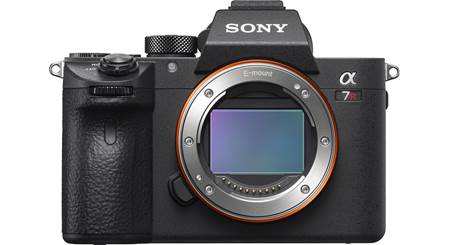
Sony Alpha a7R III (no lens included)
- 5-axis in-body image stabilization helps keep photos and videos blur- and shake-free
- built-in Wi-Fi® allows you to transfer photos and video to a compatible mobile device for instant sharing
- 42.4-megapixel full-frame sensor is optimized for 4K and low-light video
Loading...
Loading accessories...
Customer Q&A
Loading...
Loading articles...

